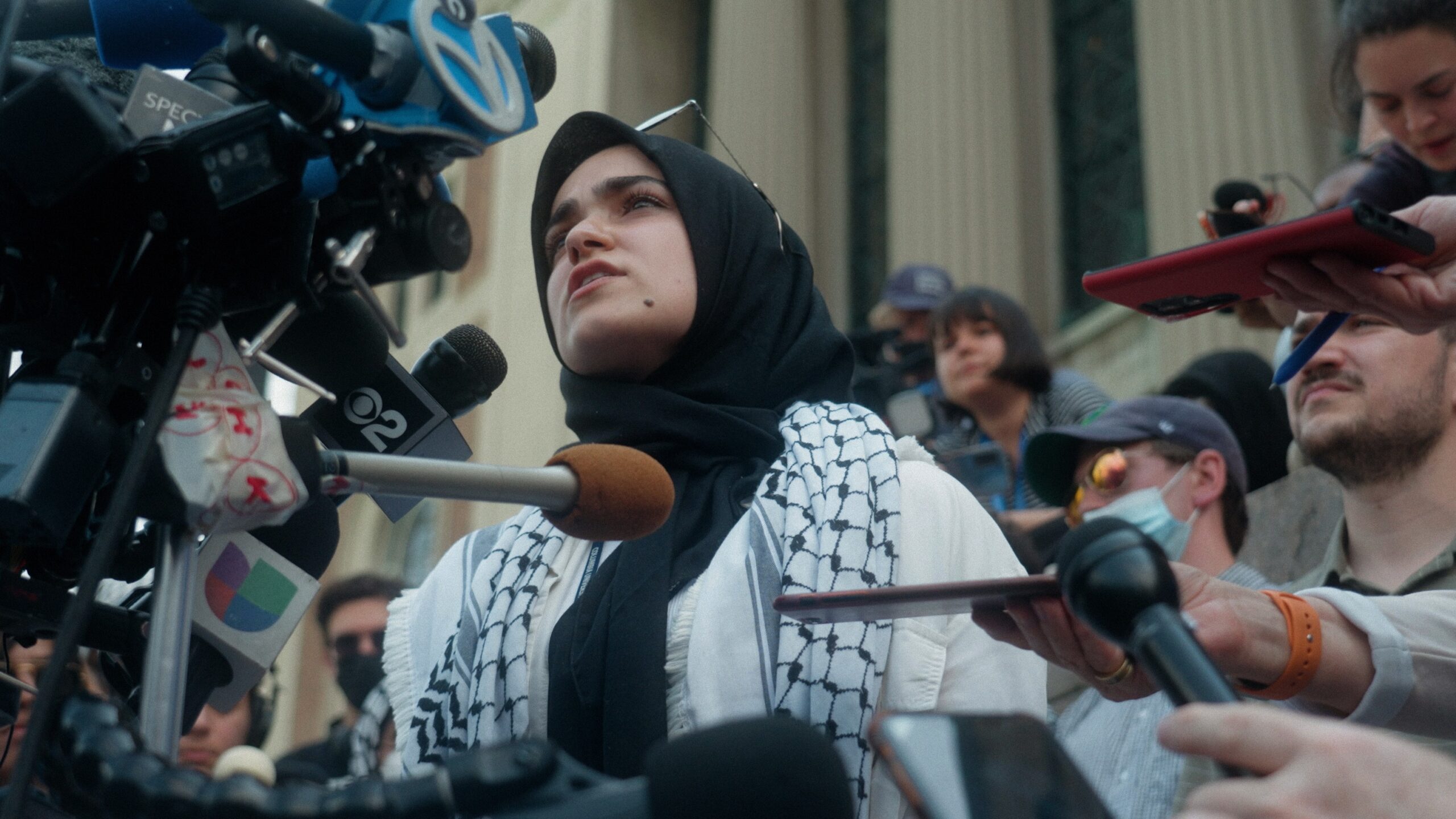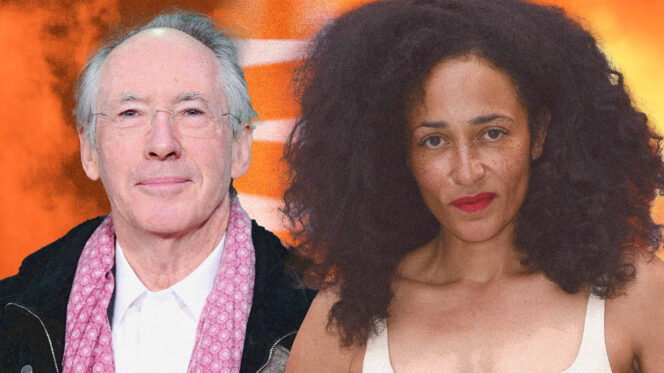Columbia University ‘Stupidity’ on Gaza Encampments Radicalised Students Worldwide
‘One day they’ll be seen as heroes.’
by Juliet Jacques
6 June 2025

Billionaire-backed? Not us. Unlike mainstream media, Novara Media runs on the support of 12,000 people like you, which keeps us editorially independent. Chip in today and help build people-powered media.
“One of the core themes of The Encampments is that when you overtly suppress a cause, people become radicalised,” says director Michael T. Workman.
Co-directed by Kei Pritsker and distributed by Watermelon Pictures, The Encampments explores how Palestine solidarity camps at Columbia University sparked worldwide student protests. Columbia’s encampments were set up in April 2024 – seven months into Israel’s genocidal war on Gaza – in an attempt to pressure the institution into divesting from Israel.
Combining footage from the encampments, interviews with participants like lead negotiator Mahmoud Khalil and mainstream US media coverage, the 2025 documentary examines how the Columbia occupation inspired similar actions elsewhere in the US and across the world.
“The heavy-handed way Columbia had their students arrested was what spurred the global movement,” Workman tells Novara Media. “It was stupid even from their cynical perspective. It’s the same with what Marco Rubio and the Trump administration are doing with Mahmoud, and the other students they’ve detained or deported.
“One day, these students will be widely seen as heroes, and everyone will claim they always opposed the genocide.”
Since Workman and Pritsker completed The Encampments, the Trump government has stripped Columbia of $400m of federal funding and is threatening to remove the university’s accreditation, saying the pro-Palestine protests violated anti-discrimination laws. Graduate student Khalil, who features prominently in the film, was arrested by ICE agents on 8 March, despite them not having a warrant, and Khalil being a lawful permanent resident of the US.
“One of the hardest things about making a documentary is deciding when it’s done, as it never really is – life keeps going,” says Workman. “When Mahmoud was abducted, of course we asked how it would affect the film. We concluded that his case might take a long time and although it’s related, The Encampments is a precursor to that event.
“We wanted to combat the narratives around the encampments. In some ways, our film is immediately out of date, but we had something ready to put out that would provide context when Mahmoud was detained.”
The documentary focuses on the three encampments established (and then suppressed) on Columbia’s campus in April and May 2024, but the project began months earlier. “Kei had been reporting on the protests at Columbia since November 2023, when they banned Students for Justice in Palestine and Jewish Voice for Peace,” says Workman. “The day before the encampment started in April, the organisers called Kei. Once the students thought the NYPD would clear the encampment, he decided to stay the night, and ended up being there for 12 days.
“Munir Atalla at Watermelon Pictures saw the cut and said he should turn it into a feature documentary. That’s my trade – and when I came on board. We started doing interviews and filming the students. We wanted to make it as quickly as possible – we finished it in seven and a half months.”
Gaining the trust of the students was crucial, says Workman. “People have good reason to be suspicious of the media, and of documentary filmmakers in particular,” he says, explaining how disciplined the students were with their approach to outsiders, mostly refusing to talk to the media except through designated spokespersons between 2-4pm, and making sure no drugs or alcohol were consumed onsite.
“They only let a small amount of media into the encampment. There were lots of things we weren’t able to film, for student safety.” Workman and Pritsker showed people the clips they wanted to use after filming, asking if they were happy to sign a release form on that basis. “It was more challenging with our main interviewees,” says Workman. “We showed them a rough cut, and they signed after that. Once Mahmoud was abducted, some students didn’t want to participate any more, while others wanted their faces blurred. We were changing the film a lot in the final few weeks before release.”
The amount of footage from outside the encampments is notable. Licensing television footage is not as difficult in the US as in the UK, and the directors were able to include coverage from Fox News and elsewhere under fair use laws, with filmed speeches from New York’s notorious mayor Eric Adams being in the public domain. “We had a producer on the ground in Palestine working with a camera operator,” says Workman. “Our producer, Matthew Belen, helped us to get some interviews, and we had to license footage from students as well.”
The film has attracted plenty of interest, outside the US where audiences are keen to understand how the superpower has descended deeper into far-right authoritarianism, and within it, where people want an impetus to resist it. Indeed, The Encampments has already shown in 130 American cinemas, and will be available online, even though no major streaming networks have taken it on.
“We premiered in Copenhagen and started screening it in Canada a couple of weeks ago,” says Workman. “It’s a little different as it’s close to the US, but the encampment movement was global, so international screenings have given us a chance to hear about different state and police responses – even so, audiences were often surprised by the level of the suppression.
“Some of the worst footage of police violence was found in Calgary, and the situation in Berlin – and Germany in general – has been quite intense. Talking to people abroad, we’ve been navigating differences but also similarities.”
The Encampments has arrived when there has been a discernible shift in mainstream political and media attitudes towards the genocide, in the UK at least, and Workman says there has been far less hostility towards the documentary than he expected.
“People – even those who were in the middle on this issue – have been largely supportive,” he says. “There have been the usual critiques of the film as being one-sided, but I think this is a good opportunity to learn about media literacy. The point isn’t to consume one piece of media and decide it’s the only thing that’s true, but to take in different perspectives to inform your understanding. If you want the mainstream or Zionist position, it’s not hard to find, although it may well contain plenty of mistruths.
“The filmmaker and the editor, the cinematographer, everyone involved makes thousands of subjective decisions throughout, so even if there’s some sort of ‘balance’, I find it problematic to obfuscate our point of view,” continues Workman. “It’s better to be open and honest about our values, and about being on the side of the students and of Palestinian liberation.”
On how The Encampments doesn’t interview any of their opponents, be they politicians or the pro-Israel counter-protestors, Workman says: “You’re only asked to present the opposite position if you’re going against the hegemonic position. If I were making a film about the US civil rights movement, I wouldn’t be asked to include David Duke and the KKK.” Although he acknowledges that he might well have faced such demands, had he made such a film in the 1960s.
In the future, Workman predicts “Columbia University will have our documentary on their syllabus” – if, he stresses, the institution still exists. “They’ll celebrate the encampments like they celebrate the uprisings of 1968, while still trying to crush any similar movements that arise. We just want to push that narrative forward, and play our part in getting history to absolve these students.”
The Encampments opens in select UK and Irish cinemas on 6 June.
Juliet Jacques is a writer, filmmaker, broadcaster and academic.


